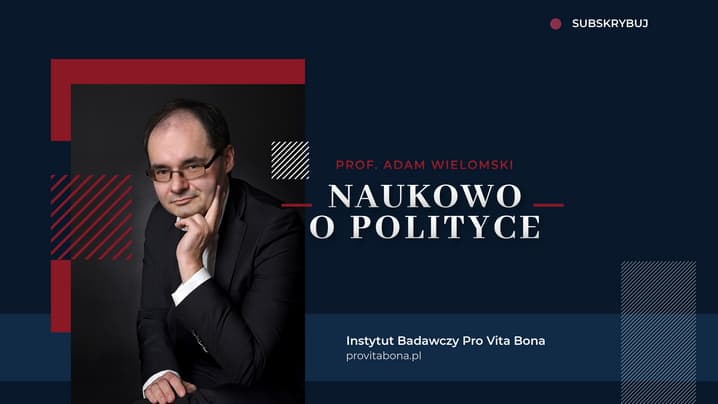Michał Krupa: Do you believe, like many commentators, that the election of Donald Trump signifies a new era in American politics, which will shatter old identities and forge new alliances?
Patrick Deneen: There can be no doubt that the election of Donald Trump signals a significant shift in the future course of Presidential politics, particularly a shake-up in the relatively stable party coalitions since the 1980s. A populist uprising has shaken both the Right and the Left, and puts into play new potential for government activism especially in national and global economic affairs. While the congressional Republican Party continues to embrace a largely libertarian, global, and pro-business economic policies, Trump showed both in the primaries and Presidential election that the energy among grassroots Republican voters lies not in that customary stance, but rather in support of more active government intervention in protecting jobs of policies of the blue-collar and less-mobile workforce. Meanwhile, the social libertarianism of the Left, especially regarding sexual ethics and identity politics, has shown itself to be inextricably linked with extensive government activism, especially in efforts to enforce the new sexual morality on every aspect of public, social, and even private life, including families and churches. While it is believed by some that the Democrats narrowly lost the Presidential election in part due to their “illiberal liberalism,” the Left shows no sign of moderating its ideological fervor in support of the Sexual revolution. In sum, the recent election has shown the bankruptcy of libertarianism both as an economic and social matter, but coastal elites in both parties continue to embrace ideological variants of the libertarian doctrine.
MK: From your perspective, what issues should be prioritized in this first year of a Trump Administration?
PD:I would like to see promised investments in infrastructure, both as an undertaking that could create many new, meaningful jobs around the country, and as an investment in the national and especially regional economies located around cities besides those that have benefited from globalization. This would include not only the usual expenditures on highways, but I would like see major investments in regional rail improvements, especially in and around cities that are beginning to see some rebound from decades-long decline. Interestingly, this campaign promise is generally opposed by Republicans, but might find support among many Democrats, suggesting that there might be a potential coalition to be forged over this issue.
As for executive orders, I think it would be a socially beneficial as well as a winning political strategy for President Trump to move a number of agencies out of Washington D.C. and to smaller, less wealthy cities in the Midwest and South that would greatly benefit from the jobs and attendant economic activity. For most people outside the Washington D.C. corridor, the capital has become too wealthy and too much of a “bubble,” and it is always a danger to a republic when too much of the nation’s wealth and elite class is centrally concentrated.
I would like to see efforts to protect religious liberty through national legislation, but I don’t expect either the President or the mainstream of the Republican Party to pursue this agenda for fear of being branded “bigots” and “intolerant.”
MK:Do you believe Trump will deliver on the promises he made concerning social issues? For example, do you see a real chance of abolishing Roe v Wade under a Trump Administration?
PD: Already we see Trump having backed away from his promise to be “the greatest defender” of religious liberty, almost certainly at the request of his children, who are considerably more socially liberal than Trump’s electorate. However, Trump will satisfy many social conservatives through his court appointments, including the appointment of Neil Gorsuch to replace Antonin Scalia on the Supreme Court. Still, as we are well-aware from past examples of Reagan-appointees such as Anthony Kennedy or Bush appointees such as David Souter, judges can be unpredictable and, once enjoying lifetime tenures, will often reveal more liberal perspectives than might initially have been expected (a move in a more conservative direction is almost never the case). One would have thought by now that social conservatives would have demanded more than Court appointments as the main means to achieving their ends, but this long-standing strategy of avoiding potentially damaging “culture war” issues in the political realm, and handing them over to the judicial realm, remains a tried-if-not-altogether-true strategy of Republican presidents.
MK: Many conservative and traditionalist commentators see much merit, but also much to criticize in the diagnosis of the so-called Alt-Right movement in the United States. On the one hand, there is no doubt that the Left in America seems to specialize lately in demonizing White Americans. But are the Alt-Right solutions correct? Is this in reality a racial war or a war of liberals against any and all traces of Christian and Western Civilization as such in the U.S.?
PD: It’s not clear to me that the alt-right is any larger or more influential as a political movement as it has been in the past; what is clearly the case, however, is that media attention to its existence has increased exponentially. My suspicion is that by casting all (or most) Trump support as essentially driven by racial considerations, the Left can dismiss Trump supporters as racists, and their concerns as unworthy of consideration or discussion.
With that said, I would not be surprised to see growth in alt-right phenomenon in the U.S., particularly as identity politics remains a core commitment of the Left. The alt-right phenomenon, however, seems as tribal and essentially anti-Christian as its Leftist variant. Christianity was the world’s first religion to transcend racial, ethnic, and national boundaries (even as it was remarkably supple in its support of forms of local Christian culture), and to the extent that we witness American politics moving toward a form of tribal politics grounded in divisions based on race, we can safely conclude that America has truly become a post-Christian nation.
MK: You are well-known for your criticism of what may seem as too optimistic interpretations of the principles guiding the American Founding. Many conservatives equate the „natural law” supposedly defended by the Founders with the classical understanding of the term. If I understand you correctly, however, the „natural law” of the revolutionary period was not the natural law of St. Thomas Aquinas or Aristotle. Can you elaborare?
PD: It would require a lengthy treatise to address this question properly, but suffice to say that I believe that liberalism broadly routed pre-liberal classical and Christian ideas and practice not merely by repudiating its core principles, but at the same time by “colonizing” its key concepts, such as “liberty,” “rights,” and, of course, “natural law.” While original liberal sources such as John Locke used the phrase “Law of Nature” to describe the conditions and basic “rules” that applied to humans in their natural, “given” state, his understanding of those laws were very different than those of a Cicero, Augustine or Aquinas. A main point of difference was that Thomistic natural law was understood to govern humans for the end of the achievement of their summum bonum, or in the Greek, their telos. By contrast, Lockean (and American) liberalism rests on a fundamental rejection of the idea that human beings have a telos, and rather rests on the idea that humans largely have it within their power to use nature to achieve their own preferences and desires. Unsurprisingly, liberalism becomes the regime in which not only is the stuff of nature ultimately serve human wants, but human nature itself becomes subject to our manipulation. The unfolding of the sexual revolution is one of the fruits of this sea-change in understanding of what is meant by the “laws of nature.”
MK: In your article „The Case for 'Serfdom’ Rightly Understood” you write that: „Conservatives only empower the state when they make an idol of liberty.” Such a statement, however, stands in direct contrast with the credo of many, if not most, of today’s American conservatives. The fundamental question would seem to be: did the Founders desire to make an idol of liberty? What truly should be the righteous mission of conservatives in the United States?
PD Building on the previous answer, what I meant is that conservatives end up being liberals – and are thus incapable of conserving much of anything – when they adopt the liberal understanding and definition of “liberty,” by which it is understood that liberty is the condition where individuals can act largely without obstacles to pursuit and achievement their individual desires. Conservatives are accustomed to thinking of liberty in these terms when speaking and pursuing policies related to the economy, but believe that somehow a firewall can be erected between thinking of oneself as a libertarian economic actor and an autonomous, unfettered chooser in all other respects. However, as we have seen, a logical outcome of a consumerist, utilitarian mindset is to colonize all aspects of life, including considerations of marriage, children, and even one’s own sexual identity and, of course, sexual behavior.
When we look at much of the data concerning today’s “millennial” generation, we see a group of people who, on the on hand, seek to minimize any deep entanglements with other humans, preferring lightly-held relationships that can be entered and exited with ease. They are not marrying and not having families, but also show little trust in most civil and social institutions and even toward fellow citizens. They are eschewing religious faith and institutional affiliation, and at the same time, profess far less interest in or concern for the environment. They show all the signs of a generation cut off for concerns about anyone or anything beyond the self.
At the same time, they are heavily in favor of an active and interventionist government, for instance, overwhelmingly favoring the socialism of Bernie Sanders, such as promises of free university education, debt forgiveness, free health care and, increasingly, support for a universal basic income. Their radical independence from other humans fundamentally rests upon the existence and expansion of massive state support and expenditure. This is the deepest and most paradoxical consequence of “making liberty an idol”: the only way to “create” the “free and independent” creature merely imagined by Locke in the State of Nature is through the erection of titanic state structures that make this otherwise impossible and unsustainable existence seem at least temporarily possible and desirable.
As an addendum, I don’t mean to dismiss the possibility that a good society provides decent health care and education, but rather to insist that such means that support human flourishing can only properly be offered and secured in a society based upon solidarity and mutual obligation, not one based upon the fiction of autonomy and radical independence of selves. When health care and education are offered in the context of, and in support for, the latter, then inevitably we should not be surprised to witness so much of the discussion of health care to concern the provision of contraception and abortion, on the one hand, and artificial forms of conception, on the other; while education will be transformed into a utilitarian tool for the pursuit of individual economic ends, not in support of a shared culture that builds and supports solidarity and human flourishing within families and communities.
MK: If so, would this not mean that on the ideological level, American conservatism, as it is understood today, is simply „classical liberalism”, but liberalism nonetheless?
PD: For much of the twentieth-century, American politics has revolved around a debate between two forms of liberalism – “classical” and “progressive.” As my previous answer seeks to elucidate, this apparent division merely masks a deeper set of shared commitments, above all, a shared hostility toward forms of human solidarity, relationality, and community that give priority to the health and flourishing of family, as well as forms of shared community and civic life. The contemporary breakdown of this political divide marks the visible beginning of its unsustainability, and the beginning of a broader repudiation of liberalism as a workable political philosophy and practice. These early cracks in the foundations of liberalism are not necessarily to be celebrated, given how attenuated and damaged are practices of solidarity, household economics, forms of civic common good, and healthy family life. In the absence of these social, political, and economic practices, the decline of liberalism will likely be an ugly affair.
MK: Many Catholic authors conclude that the Catholic Church over the years has also steadily become more „Americanized”, i.e. more liberal in its outlook, thanks to the prevailing liberal spirit in the United States. There once was a fervent and intellectually stimulating discussion in the US among Catholics, which even lead to the publication of an encyclical by Leo XIII on the topic, about Catholicism and Americanism. Why has this topic literally disappeared from internal Catholic discussion and intellectual inquiry?
PD: I believe that there are somewhat contingent historical and social reasons for the decline of this discussion within American Catholicism, having to do especially with efforts by leading Catholics in a variety of elite positions and institutions to create conditions for the acceptance and embrace of Catholics within the broader, Protestant American society. This effort might have been stillborn, or at least merely remained one branch of the Catholic response to Americanism, but for the intervention of World War II and then especially the Cold War. It became the interest of leading Protestant Americans to welcome the natural Catholic opposition to communism, and at the same time served the efforts of figures such as the Kennedy family the Jesuit theologian John Courtney Murray, Notre Dame president Fr. Theodore Hesburgh, and later, George Weigel, Michael Novak, and First Things founder Fr. Richard John Neuhaus – among many others – to parlay this opening to Catholics into a full acceptance of the still-maligned immigrant population of Catholics into the mainstream of American life.
Still, the discussion and debate over whether Catholicism could be understood to be compatible with liberalism never disappeared, even if it became somewhat submerged during the roughly 50 years from World War II until the fall of the Berlin Wall (a moment that marked the apparent triumph of liberal democracy – a victory that looks increasing Pyrrhic). A variety of discussions continued to be held even during that time of apparent Catholic rapprochement with American liberalism – often in the pages of Notre Dame’s Review of Politics (as documented in the recent book A Liberalism Safe for Catholicism?, co-edited by my colleague Dan Philpott and Notre Dame political science Ph.D., Ryan Anderson). I think it is not an exaggeration to say that in the past several decades since the fall of the Berlin Wall, this discussion and debate has been vigorously revived, particularly through the writings and challenges posed by such thinkers as Alasdair MacIntyre, William T. Cavanaugh, David L. Schindler, and now his son, David . Schindler, and Michael Hanby.
Professor Patrick Deneen holds a B.A. in English literature and a Ph.D. in Political Science from Rutgers University. From 1995-1997 he was Speechwriter and Special Advisor to the Director of the United States Information Agency. From 1997-2005 he was Assistant Professor of Government at Princeton University. From 2005-2012 he was Tsakopoulos-Kounalakis Associate Professor of Government at Georgetown University, before joining the faculty of Notre Dame in Fall 2012. He is the author and editor of several books and numerous articles and reviews and has delivered invited lectures around the country and several foreign nations. He is the author of, among others, „The Odyssey of Political Theory”, „Democratic Faith”, „Conserving America? Thoughts on Present Discontents”. His upcoming book is „Why Liberalism Failed”.


